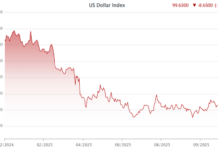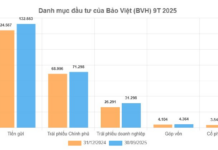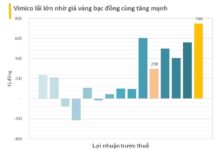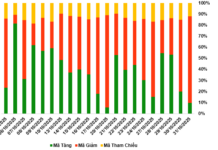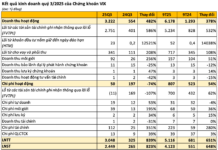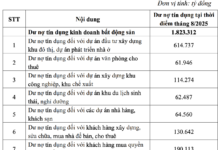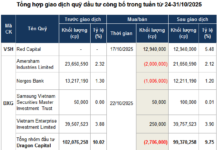According to the HOREA, the central government should provide funding for the implementation of the social housing policy (NOXH) by reallocating funds to the Vietnam Bank for Social Policies or by subsidizing interest rates for four commercial banks (Vietinbank, Vietcombank, Agribank, and BIDV) that were previously designated by the State Bank of Vietnam to implement the NOXH preferential credit policy.
This is because in the period of 2015 – 2020, due to the lack of medium-term state budget funding for the implementation of the NOXH policy, project investors and buyers or renters were practically not able to benefit from the NOXH preferential credit policy as stipulated in the 2014 Housing Law.
The 125,000 billion VND credit package, which was voluntarily contributed by five commercial banks (and recently supplemented by 5,000 billion VND from a participating joint-stock commercial bank), offers interest rates that are lower than the average commercial lending rates by 1.5 – 2%.
Currently, the application of an interest rate of 8%/year for NOXH project investors, reconstruction and rebuilding of apartment building projects within 3 years, and buyers of houses in old apartment building reconstruction and rebuilding projects within 5 years is having a positive impact. Previously, these entities had to borrow at interest rates around 12%/year.
However, the 125,000 billion VND credit package is not suitable for NOXH buyers or renters because they have to pay a relatively high interest rate of 7.5%/year and it is only applicable for a period of 5 years. Furthermore, these interest rates are adjusted every 6 months, and after the preferential period expires, the floating interest rates become applicable. Consequently, NOXH buyers or renters are hesitant to borrow due to uncertainty.
“The State Bank of Vietnam should consider expanding the eligibility of the 125,000 billion VND package to include buyers of commercial houses priced at 3.5 billion VND/unit or less, and landlords who borrow to build new or renovate and upgrade boarding houses for workers and laborers to rent.
The Ministry of Construction should restore the 110,000 billion VND credit package with an interest rate of 4.8 – 5% and a maximum loan term of 25 years, which the Ministry proposed on February 17, 2023, to implement the NOXH policy of the 2023 Housing Law for project investors and NOXH buyers or renters, in order to implement the Program for the development of at least 1 million NOXH apartments in the period of 2021 – 2030″, said Mr. Chau.

HoREA recommends raising the ceiling on profits for NOXH investors to 15%.
Regarding the view that real estate businesses are not interested in participating in NOXH development, the Association finds it inaccurate. In fact, in Ho Chi Minh City over the past 30 years, more than 15 real estate businesses have voluntarily and independently negotiated to “buy land” to implement NOXH projects or have been assigned land by competent state agencies to implement NOXH projects.
In addition, in response to the Prime Minister’s call at the Specialized Conference on NOXH in April 2023, dozens of large real estate corporations and businesses have registered more than 1.5 million NOXH apartments to participate in the “Program to build at least 1 million NOXH apartments in the period of 2021-2030”.
Therefore, in addition to credit capital, the HOREA Chairman also proposed additional or increased preferential policies for investors to encourage and attract more investors to participate in NOXH projects.
Firstly, he proposed to consider increasing the ceiling on profits for NOXH investors to 15% instead of only 10% for cases where enterprises create their own land fund, independently negotiate to repurchase land use rights from individuals or households to implement the project.
Secondly, regarding borrowing preferential capital or commercial capital (including the 125,000 billion VND package) to build NOXH, he proposed to allow investors to use the NOXH project itself as collateral, at least for cases where the investor has independently negotiated to receive land use rights or currently has land use rights. This is because currently, investors must use other assets as collateral to borrow credit capital to implement NOXH projects.
Thirdly, regarding tax incentives, the 2023 Housing Law stipulates that NOXH project investors are entitled to preferential value-added tax and corporate income tax, which is different from the 2014 Housing Law, which stipulated that NOXH construction for rent would be subject to a greater reduction in value-added tax and corporate income tax than in cases of NOXH construction for rent-to-own or sale.
In practice, no NOXH project investors for rent have benefited from this policy. This is because the Tax Laws only stipulate a 50% reduction in value-added tax and corporate income tax for NOXH project investors, without distinguishing between NOXH projects for rent or NOXH for rent-to-own or sale.
Therefore, HOREA proposed that the Ministry of Construction consult with the Ministry of Finance to request that the relevant Tax Laws be amended to stipulate a 70% reduction in value-added tax and corporate income tax for NOXH projects for rent, as stipulated in Decree 100/2015/NĐ-CP, to encourage the development of more NOXH projects for rent.
Fourthly, the Ministry of Finance should consider the proposed amendment to the Personal Income Tax Law to increase the family deduction from 11 million VND to 15 million VND for workers and from 4.4 million VND to 5.5 million VND for dependents, and to increase the taxable income in Tier 1 to 75 million VND/year instead of only 60 million VND/year as currently regulated, to align with the current practical situation.
Concurrently, the draft Decree on NOXH development should stipulate that the target recipients of NOXH policies are individuals who are not subject to personal income tax or who are subject to personal income tax from Tier 1 or below, or whose combined income with their spouse does not exceed 25 million VND/month, instead of only 15 million VND/month.






